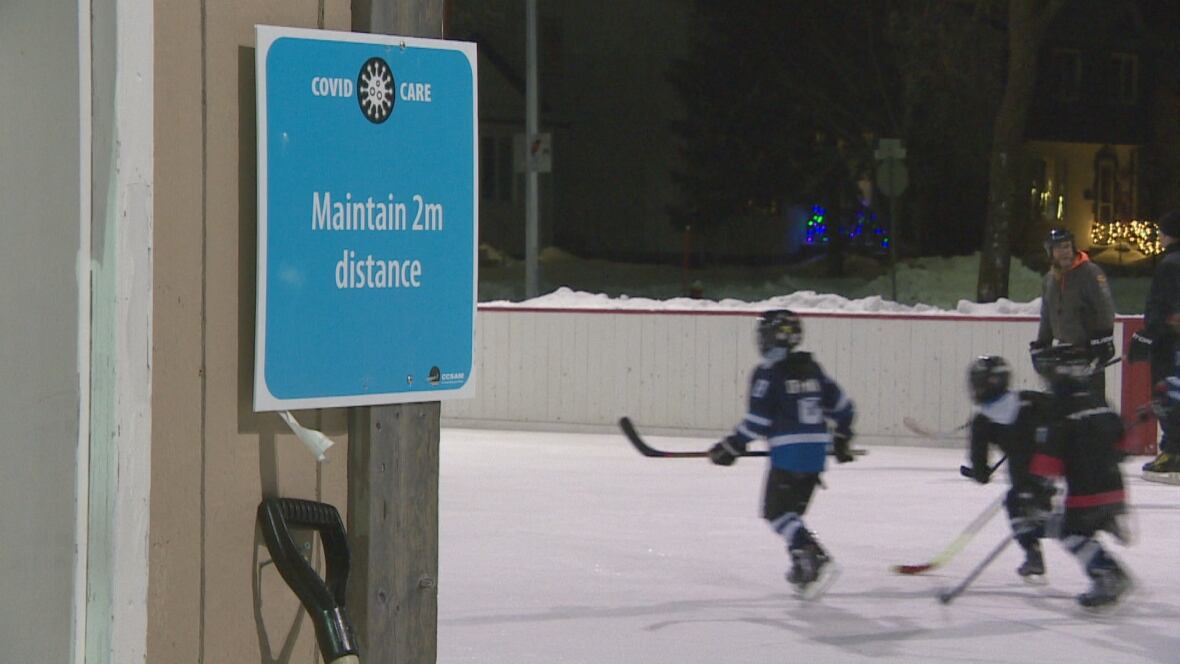Parents feeling shorthanded as Omicron threatens to overwhelm schools
'We're in a precarious situation' that makes contact tracing impractical, hockey parent concedes

It's like the Omicron variant is skating circles around Manitoba's schools.
Defensive strategies that once paid off, like informing parents of a COVID-19 exposure in their child's classroom, have been iced by the province.
"We're in a precarious situation because now it's so transmissible. I don't know if it's reasonable to conduct contact tracing anymore," said Nusraat Masood, while watching her seven-year-old son play shinny on an outdoor rink.
"I'm not wildly happy about it, but I kind of understand that the resources can't be put in place to do it any more."
Fellow hockey parents, outside the Riverview Community Centre in Winnipeg Thursday night as their youngsters took to the ice, seemed to accept the province's rationale it can no longer control the novel coronavirus on a case-by-case basis.
The individual notifications of exposures and contact tracing will be no more. The province announced Thursday it will depend on parents to monitor for symptoms, alert the school and keep their children home if need be. Health officials expect a large proportion of people to become exposed to COVID-19 in the coming weeks.
WATCH | Hockey parents respond to end of COVID notifications:
Masood feels uncertain about the return to in-person learning on Monday, but considers a return to the classroom vital.
"It's just balancing all of these things, right?" she said.
"I'm concerned for their mental health, too. I don't think it's great for them to be at home. Young people, I think, need more social stimulation."
Shayla Vokey, a mother of two, is looking forward to the return to face-to-face schooling for all. Officials are trying their best, she said, and the province's decision to end case notifications doesn't change her approach.

"I'm not worried if there's someone in her class that has it and we don't get told, because I'm always monitoring for symptoms," she said, while taking a quick break from her skate.
"I'm doing my part and I don't want to be told we can't do things."
The move to rely on individuals' personal responsibility means not every parent will take mitigation measures like contact tracing seriously, Isaac Pulford said.
"When you're not having that consistency, it's hard to keep track of everything," he said.
The ditching of exposure notifications "makes me nervous," said Brooke Koskie, another parent, "but I think it's probably the practical approach."
She's thankful this stint of remote learning will only last a week.
"I don't want to see the kids out of school, so I think it probably makes sense."

Alan Campbell, president of the Manitoba School Boards Association, said the unease felt by many parents is understandable.
Throughout the pandemic, families were kept in the loop of COVID exposures and outbreaks regularly, but now much of the information they relied upon has been stripped away, he said. (Schools will still track the infections they are aware of and will communicate publicly about absenteeism levels.)
Even though Campbell accepts that contact tracing amid a flood of cases may not be feasible, he said the messaging that the Omicron variant produces mild outcomes in the vast majority of youth doesn't alleviate all fears.
"It doesn't really matter how often someone says that kids are at a relatively low risk of adverse outcomes from COVID-19," said Campbell.
"As a parent, you don't want them to get COVID-19 because you don't want them to be the statistic where that is proven wrong."


